Edie Melson's Blog, page 371
July 23, 2015
What Draft Am I as a Writer?
by Henry McLaughlin @RiverbendSagas
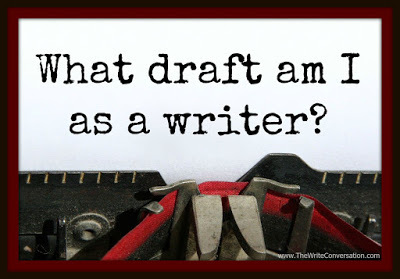 What draft as I as a writer?Writers think in terms of drafts. Not those that come in around windows and doors in the winter. But those we write. One of the axioms among fiction writers is write the first draft completely before doing any editing. We know it’s going to be mostly junk but get it done to get the junk out, to have something to work with.
What draft as I as a writer?Writers think in terms of drafts. Not those that come in around windows and doors in the winter. But those we write. One of the axioms among fiction writers is write the first draft completely before doing any editing. We know it’s going to be mostly junk but get it done to get the junk out, to have something to work with.
Michelangelo couldn’t carve David until he had a hunk of marble and chipped away everything that didn’t look like David. Our first draft is that hunk of marble. The subsequent drafts are our chipping away until the David that is our story stands before us.When we rewrite, we find within that junk nuggets of plot, setting, and character that are worth keeping. We find pieces of wordsmithing that sing and soar and have to stay.
 Then we rewrite again, three, four, five and even more drafts. Each one whittles and chips the extraneous, making the story tighter, the characters more alive, the setting more vibrant. More chunks of brilliant wordsmithing emerge. The novel gets better and better until it’s done.
Then we rewrite again, three, four, five and even more drafts. Each one whittles and chips the extraneous, making the story tighter, the characters more alive, the setting more vibrant. More chunks of brilliant wordsmithing emerge. The novel gets better and better until it’s done.
We call it our work-in-progress, our WIP.
In my meditation time recently…by the way, I wasn’t sequestered in some room with votive candles and choirs of monks intoning solemn hymns. I was in my car, driving between writers group meetings, listening to Celtic Woman. Point being, we can meditate with God anywhere.
Anyway, back from the rabbit trail. It struck me that, in many ways, I am God’s WIP. When I accepted Jesus as my Lord and Savior, I wasn’t instantly perfect. An angel didn’t descend from heaven, bop me on the head, and say “Shazam!”
 In this Christian walk, I go through seasons and changes. Some are terrifying and heart breaking—losing a son, a job, a dear friend. Some are exhilarating—birth of a child, the first grandchild, publishing the first book.
In this Christian walk, I go through seasons and changes. Some are terrifying and heart breaking—losing a son, a job, a dear friend. Some are exhilarating—birth of a child, the first grandchild, publishing the first book.
All are places where we can be edited, where God can do a work that makes us stronger for ourselves, for our families, for him.
Ultimately, we are not only the WIP being edited, we are the final editor.
It is our choice to accept and implement the opportunities for growth he is offering. He offers, he doesn’t force.
We choose to take those edits and apply them as Michelangelo applied the chisel to the granite until we see ourselves as God sees us.
Or we don’t. And, when we don’t, something goes unfinished. In us. And in his plan.
TWEETABLESAs Writers, We're God's Work in Progress - Henry McLaughlin, @Riverbensagas on @EdieMelson (Click to Tweet)
What draft am I as a #writer - thoughts from author Henry McLaughlin, @Riverbendsagas (Click to Tweet)
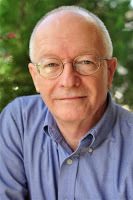 Henry’s debut novel, Journey to Riverbend, won the 2009 Operation First Novel contest. He serves as Associate Director of North Texas Christian Writers. Henry edits novels, leads critique groups, and teaches at conferences and workshops. He enjoys mentoring and coaching individual writers. Connect with Henry on his blog, Twitter and Facebook.
Henry’s debut novel, Journey to Riverbend, won the 2009 Operation First Novel contest. He serves as Associate Director of North Texas Christian Writers. Henry edits novels, leads critique groups, and teaches at conferences and workshops. He enjoys mentoring and coaching individual writers. Connect with Henry on his blog, Twitter and Facebook.
 What draft as I as a writer?Writers think in terms of drafts. Not those that come in around windows and doors in the winter. But those we write. One of the axioms among fiction writers is write the first draft completely before doing any editing. We know it’s going to be mostly junk but get it done to get the junk out, to have something to work with.
What draft as I as a writer?Writers think in terms of drafts. Not those that come in around windows and doors in the winter. But those we write. One of the axioms among fiction writers is write the first draft completely before doing any editing. We know it’s going to be mostly junk but get it done to get the junk out, to have something to work with. Michelangelo couldn’t carve David until he had a hunk of marble and chipped away everything that didn’t look like David. Our first draft is that hunk of marble. The subsequent drafts are our chipping away until the David that is our story stands before us.When we rewrite, we find within that junk nuggets of plot, setting, and character that are worth keeping. We find pieces of wordsmithing that sing and soar and have to stay.
 Then we rewrite again, three, four, five and even more drafts. Each one whittles and chips the extraneous, making the story tighter, the characters more alive, the setting more vibrant. More chunks of brilliant wordsmithing emerge. The novel gets better and better until it’s done.
Then we rewrite again, three, four, five and even more drafts. Each one whittles and chips the extraneous, making the story tighter, the characters more alive, the setting more vibrant. More chunks of brilliant wordsmithing emerge. The novel gets better and better until it’s done.We call it our work-in-progress, our WIP.
In my meditation time recently…by the way, I wasn’t sequestered in some room with votive candles and choirs of monks intoning solemn hymns. I was in my car, driving between writers group meetings, listening to Celtic Woman. Point being, we can meditate with God anywhere.
Anyway, back from the rabbit trail. It struck me that, in many ways, I am God’s WIP. When I accepted Jesus as my Lord and Savior, I wasn’t instantly perfect. An angel didn’t descend from heaven, bop me on the head, and say “Shazam!”
 In this Christian walk, I go through seasons and changes. Some are terrifying and heart breaking—losing a son, a job, a dear friend. Some are exhilarating—birth of a child, the first grandchild, publishing the first book.
In this Christian walk, I go through seasons and changes. Some are terrifying and heart breaking—losing a son, a job, a dear friend. Some are exhilarating—birth of a child, the first grandchild, publishing the first book. All are places where we can be edited, where God can do a work that makes us stronger for ourselves, for our families, for him.
Ultimately, we are not only the WIP being edited, we are the final editor.
It is our choice to accept and implement the opportunities for growth he is offering. He offers, he doesn’t force.
We choose to take those edits and apply them as Michelangelo applied the chisel to the granite until we see ourselves as God sees us.
Or we don’t. And, when we don’t, something goes unfinished. In us. And in his plan.
TWEETABLESAs Writers, We're God's Work in Progress - Henry McLaughlin, @Riverbensagas on @EdieMelson (Click to Tweet)
What draft am I as a #writer - thoughts from author Henry McLaughlin, @Riverbendsagas (Click to Tweet)
 Henry’s debut novel, Journey to Riverbend, won the 2009 Operation First Novel contest. He serves as Associate Director of North Texas Christian Writers. Henry edits novels, leads critique groups, and teaches at conferences and workshops. He enjoys mentoring and coaching individual writers. Connect with Henry on his blog, Twitter and Facebook.
Henry’s debut novel, Journey to Riverbend, won the 2009 Operation First Novel contest. He serves as Associate Director of North Texas Christian Writers. Henry edits novels, leads critique groups, and teaches at conferences and workshops. He enjoys mentoring and coaching individual writers. Connect with Henry on his blog, Twitter and Facebook.
Published on July 23, 2015 01:00
July 22, 2015
Digging Deeper to Get to Know Your Characters—Sometimes a Game of Hide & Seek
by DiAnn Mills @DiAnnMills
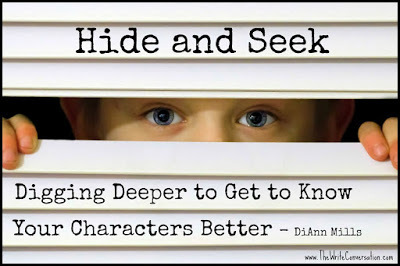 You’re an excellent writer. You’ve spent hours developing your character, but something’s missing.
You’re an excellent writer. You’ve spent hours developing your character, but something’s missing.
Frustration is eating a hole into your creativity because your character is too proud to admit he might not be perfect. You have: Researched your character’s personality.Interviewed him and asked tough questions.Developed a unique voice and dialogue.Established a setting that promises to spin the story into a whirlwind of action.
But the character is guarding his weaknesses and flaws. He won’t divulge one moment of backstory, and you’re helpless to discover his motivation for any behavior. It’s time to hit the psychology books. After all, this closed-mouth character may be the best one you’ve ever created. Flaws and weaknesses in human nature stem back to creation. God created us with three needs: relationships, significance, and security. Those needs are supposed to be satisfied by Him. But Adam and Eve kicked off their own program of relying on God. The question is how does your character fulfill his basic needs that don’t factor God into the equation? The following is a list of those weaknesses that your character may use to fill the empty spots in his life. Where does your character fit?MoneyPowerSexMaterial acquisitionWork, relationships, education, and aesthetic values
It’s time to hit the psychology books. After all, this closed-mouth character may be the best one you’ve ever created. Flaws and weaknesses in human nature stem back to creation. God created us with three needs: relationships, significance, and security. Those needs are supposed to be satisfied by Him. But Adam and Eve kicked off their own program of relying on God. The question is how does your character fulfill his basic needs that don’t factor God into the equation? The following is a list of those weaknesses that your character may use to fill the empty spots in his life. Where does your character fit?MoneyPowerSexMaterial acquisitionWork, relationships, education, and aesthetic values
 Your character uses his weaknesses to satisfy unmet needs. Characters have unmet needs that fall into these categories.Survival - the need to have continued existenceSecurity - the need for emotional and economic stabilitySex - the need for intimacySignificance - the need to amount to something and be worthwhileSelf-fulfillment - the need to achieve goalsSelfhood - the need for a sense of identity
Your character uses his weaknesses to satisfy unmet needs. Characters have unmet needs that fall into these categories.Survival - the need to have continued existenceSecurity - the need for emotional and economic stabilitySex - the need for intimacySignificance - the need to amount to something and be worthwhileSelf-fulfillment - the need to achieve goalsSelfhood - the need for a sense of identity
Once the writer is able to discover weaknesses and unmet needs, then motivation slips into an issue of backstory. Human motives have been categorized into four areas, and these areas extend into each one. BiologicalSocialCognitiveSpiritual
So take a look at that stubborn character. What is his or her basic need? Is it relationships, significance, or security? Or a combination? What does he use as a Band-Aid to cover up what’s lacking in his life? What category does his unmet need slide into? Now what motivates your character into action? I bet you’ll learn something remarkable.
TWEETABLES
Hide & Seek: the process of getting to know your characters - via @DiAnnMills on @EdieMelson (Click to Tweet)
Digging Deeper to Get to Know Your Characters - a game of Hide & Seek - @DiAnnMills (Click to Tweet)
 DiAnn Mills is a bestselling author who believes her readers should expect an adventure. She combines unforgettable characters with unpredictable plots to create action-packed, suspense-filled novels.
DiAnn Mills is a bestselling author who believes her readers should expect an adventure. She combines unforgettable characters with unpredictable plots to create action-packed, suspense-filled novels.
Her titles have appeared on the CBA and ECPA bestseller lists; won two Christy Awards; and been finalists for the RITA, Daphne Du Maurier, Inspirational Readers’ Choice, and Carol award contests. Library Journal presented her with a Best Books 2014: Genre Fiction award in the Christian Fiction category for Firewall.
DiAnn is a founding board member of the American Christian Fiction Writers; the 2015 president of the Romance Writers of America’s Faith, Hope, & Love chapter; a member of Advanced Writers and Speakers Association, and International Thriller Writers. She speaks to various groups and teaches writing workshops around the country. She and her husband live in sunny Houston, Texas.
DiAnn is very active online and would love to connect with readers on any of the social media platforms listed at www.diannmills.com.
 You’re an excellent writer. You’ve spent hours developing your character, but something’s missing.
You’re an excellent writer. You’ve spent hours developing your character, but something’s missing. Frustration is eating a hole into your creativity because your character is too proud to admit he might not be perfect. You have: Researched your character’s personality.Interviewed him and asked tough questions.Developed a unique voice and dialogue.Established a setting that promises to spin the story into a whirlwind of action.
But the character is guarding his weaknesses and flaws. He won’t divulge one moment of backstory, and you’re helpless to discover his motivation for any behavior.
 It’s time to hit the psychology books. After all, this closed-mouth character may be the best one you’ve ever created. Flaws and weaknesses in human nature stem back to creation. God created us with three needs: relationships, significance, and security. Those needs are supposed to be satisfied by Him. But Adam and Eve kicked off their own program of relying on God. The question is how does your character fulfill his basic needs that don’t factor God into the equation? The following is a list of those weaknesses that your character may use to fill the empty spots in his life. Where does your character fit?MoneyPowerSexMaterial acquisitionWork, relationships, education, and aesthetic values
It’s time to hit the psychology books. After all, this closed-mouth character may be the best one you’ve ever created. Flaws and weaknesses in human nature stem back to creation. God created us with three needs: relationships, significance, and security. Those needs are supposed to be satisfied by Him. But Adam and Eve kicked off their own program of relying on God. The question is how does your character fulfill his basic needs that don’t factor God into the equation? The following is a list of those weaknesses that your character may use to fill the empty spots in his life. Where does your character fit?MoneyPowerSexMaterial acquisitionWork, relationships, education, and aesthetic values Your character uses his weaknesses to satisfy unmet needs. Characters have unmet needs that fall into these categories.Survival - the need to have continued existenceSecurity - the need for emotional and economic stabilitySex - the need for intimacySignificance - the need to amount to something and be worthwhileSelf-fulfillment - the need to achieve goalsSelfhood - the need for a sense of identity
Your character uses his weaknesses to satisfy unmet needs. Characters have unmet needs that fall into these categories.Survival - the need to have continued existenceSecurity - the need for emotional and economic stabilitySex - the need for intimacySignificance - the need to amount to something and be worthwhileSelf-fulfillment - the need to achieve goalsSelfhood - the need for a sense of identity Once the writer is able to discover weaknesses and unmet needs, then motivation slips into an issue of backstory. Human motives have been categorized into four areas, and these areas extend into each one. BiologicalSocialCognitiveSpiritual
So take a look at that stubborn character. What is his or her basic need? Is it relationships, significance, or security? Or a combination? What does he use as a Band-Aid to cover up what’s lacking in his life? What category does his unmet need slide into? Now what motivates your character into action? I bet you’ll learn something remarkable.
TWEETABLES
Hide & Seek: the process of getting to know your characters - via @DiAnnMills on @EdieMelson (Click to Tweet)
Digging Deeper to Get to Know Your Characters - a game of Hide & Seek - @DiAnnMills (Click to Tweet)
 DiAnn Mills is a bestselling author who believes her readers should expect an adventure. She combines unforgettable characters with unpredictable plots to create action-packed, suspense-filled novels.
DiAnn Mills is a bestselling author who believes her readers should expect an adventure. She combines unforgettable characters with unpredictable plots to create action-packed, suspense-filled novels. Her titles have appeared on the CBA and ECPA bestseller lists; won two Christy Awards; and been finalists for the RITA, Daphne Du Maurier, Inspirational Readers’ Choice, and Carol award contests. Library Journal presented her with a Best Books 2014: Genre Fiction award in the Christian Fiction category for Firewall.
DiAnn is a founding board member of the American Christian Fiction Writers; the 2015 president of the Romance Writers of America’s Faith, Hope, & Love chapter; a member of Advanced Writers and Speakers Association, and International Thriller Writers. She speaks to various groups and teaches writing workshops around the country. She and her husband live in sunny Houston, Texas.
DiAnn is very active online and would love to connect with readers on any of the social media platforms listed at www.diannmills.com.
Published on July 22, 2015 01:00
July 21, 2015
Writers are Speakers - 7 Ways to Destroy Your Speaking Career
by Lucinda Secrest McDowell @LucindaSMcDowell
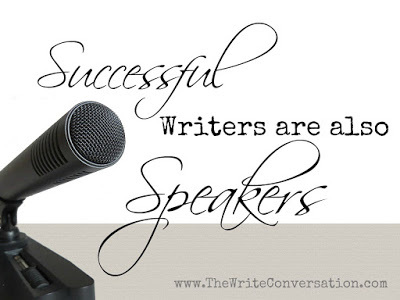 Writers are often asked to speak.
Writers are often asked to speak.
Whether you are a writer-who-speaks or speaker-who-writes, it is always important to keep some basic principles in mind as you venture out to various events.
Remember, that your speaking can enhance your writing career. So, be on the lookout for these 7 mistakes you don’t want to make.
1. Be hard to contact.In this day of social media, internet and cell phones attached to the hip, it would seem impossible that we are ever truly ‘hard to contact.’ But you would be amazed at the event planners who complain their emails or phone messages are never returned. Unfortunately, this gives the impression of an aloof writer who is not interested in speaking, or worse, a diva. Thus, be sure to be clear on your website, business cards, etc. how others are to contact you. If it is directly, make a point of answering in a prompt fashion (even if it’s just “I’m out of town this weekend, but will respond next week when I return to the office.”) If you are using an assistant, be firm about the turnaround timing of inquiries and how she should answer them. Remember, this is your first point of personal contact and you want to make a good impression – this is your audience!
 Don't use the same talk for every event!2. Use the same talk for every event.Yes, you may have a sensational story, or a particular ‘brand,’ or a latest book that you want to push, but it is vitally important that you tailor each presentation specifically to the audience of that event. Knowing to whom you are speaking (college students or senior citizens? secular audience or church group? professional experts in your field or a neighborhood book club?) makes all the difference in which illustrations to use, and how to tailor your talk. It is quite helpful to have a ‘repertoire’ of subjects available online to get organizers primed, but even then, each presentation must be updated and tweaked.
Don't use the same talk for every event!2. Use the same talk for every event.Yes, you may have a sensational story, or a particular ‘brand,’ or a latest book that you want to push, but it is vitally important that you tailor each presentation specifically to the audience of that event. Knowing to whom you are speaking (college students or senior citizens? secular audience or church group? professional experts in your field or a neighborhood book club?) makes all the difference in which illustrations to use, and how to tailor your talk. It is quite helpful to have a ‘repertoire’ of subjects available online to get organizers primed, but even then, each presentation must be updated and tweaked.
3. Make unreasonable demands.While it is true that honorariums, travel expenses, book sales and informal gatherings greatly vary for author/speakers depending on the group, geographic location, and nature of event, common courtesy and manners are universal. It is up to you to always be professional, yet kind and flexible as logistics are discussed. Event planners will not invite back a speaker who was high maintenance. And yes, they do talk to one another… Plus, if you are a follower of Christ, then you should also have a servant’s spirit in bringing the message and interfacing with the people who attend.
4. Read your manuscript.
Please don’t. However, do make sure you have notes or an outline. Some speakers prefer to have a word-by-word manuscript handy, but it is imperative not to read each word. Just highlight the main points and then memorize all of your stories and illustrations. Better yet, speak without notes! Of course, the only way this will happen is if you know your material, which comes from practice, practice, practice. Did anyone ever say speaking was easy? Don’t forget to polish your opening (this must grab your audience from the get-go) and to craft your closing so that there is a definite takeaway. The more you learn your material, the more natural you will be in presenting it. Be yourself and you will engage your listeners, not bore them.
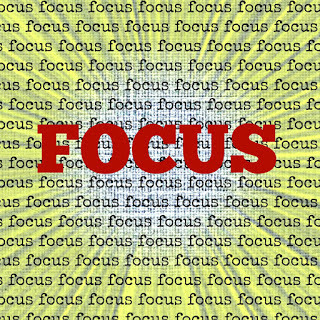 Don't ramble on and on with no focus!5. Ramble on and on with no focus.
Don't ramble on and on with no focus!5. Ramble on and on with no focus.
Know what you are going to say. Say it. Then remind your audience of what you said. This is a simplistic, yet proven formula. Outlines are your friend. Make sure you know the most important takeaway you are aiming for, and then deliberately make that point, supporting it with research and anecdotes. Tell stories but make sure each story has a purpose to it and that it is clear. As mentioned earlier, spend time on a fabulous opening and closing. Always finish in the time frame you were given by the event organizer. Reconfirm the length at the event and if it has been shortened (yes, this happens from time to time), leave out a few illustrations. They will remember you and invite you back.
6. Keep your distance from your audience.
Whether you are at a weekend conference or a one night banquet, you can make more friends by engaging your audience both before and after you speak. I often ‘work the room’ ahead of time, meeting people and asking questions. I introduce myself and many don’t even realize I’m the keynote speaker until I later take the platform. By then they are my ‘friends’ and eager to hear what I have to say. After speaking, I am totally accessible back at my booktable, not just to sign/sell books but to listen, pray or take photos. As a guest speaker, the entire event is your contracted service, not just the time behind the podium. Of course, during a weekend conference, I do have times away in my room to regroup. Even if you are an introvert, make an effort to engage with your audience.
7. Never look back.I always mail (yes, US Postal Service) a thank you note on my professional stationery to the event organizer within a week or two of my return from speaking. After that, I also contact them by email and ask for a few sentences of recommendation that I can post on my website “Endorsements” page. Sometimes they will respond to that and sometimes they don’t.. When I post their comments on my website, I send them a thank you email and a link to their comment and sometimes a photo of me with the group or the team. Each Christmas I send a card and news update to each of the places I have spoken that year. Now, if this seems like a bit of work, it is. But never burn your bridges. Be thankful for the opportunity to share your message with an audience, and tell them so.
As we seek to become the best communicators possible, God is the One who will open and close doors, gently guiding us into avenues of influence. Let’s make sure that we honor Him always as we journey forth.
“Your authenticity does not depend on proving to people or to God with pitches, paints or pen – that you really are quite a piece of work. Rather, I pray that you are discovering that your authenticity lies in who you are constantly becoming in Christ, and that you make art because you cannot keep yourself from the simple joy of shaping something as best you can and then pouring it over Jesus’ feet. The only reason for doing our very best, despite any cost, is the infinite worth of Jesus, for making art this way is where authenticity lies… The best artists begin by being influenced and end up influencing.” – quoted by Michael Card in “Scribbling in the Sand”
TWEETABLESYep, writers need to be #speakers - 7 Ways to destroy your speaking career - @LucindaSMcDowell (Click to Tweet)
Don't destroy your speaking & #writing career - 7 tips from LucindaSMcDowell (Click to Tweet)
 Lucinda Secrest McDowell, M.T.S., is the author of 11 books, contributing author to 25 books, and has published in more than 50 magazines. A graduate of Gordon-Conwell Theological Seminary and Furman University, she studied at the Wheaton Graduate School of Communication and served as Communications Specialist for the Lausanne Committee for World Evangelization (Thailand) and Editor for Billy Graham’s International Conference for Itinerant Evangelists (Netherlands). A member of Advanced Writers and Speakers Association (AWSA), she has received “Writer of the Year” awards from both Mt. Hermon and Blue Ridge Writers Conferences. Cindy speaks internationally through her ministry “Encouraging Words” and co-directs the New England Christian Writers Retreat. Known for her ability to convey deep truth in practical and winsome ways, she writes from “Sunnyside” cottage in New England. Visit her online at www.EncouragingWords.net
Lucinda Secrest McDowell, M.T.S., is the author of 11 books, contributing author to 25 books, and has published in more than 50 magazines. A graduate of Gordon-Conwell Theological Seminary and Furman University, she studied at the Wheaton Graduate School of Communication and served as Communications Specialist for the Lausanne Committee for World Evangelization (Thailand) and Editor for Billy Graham’s International Conference for Itinerant Evangelists (Netherlands). A member of Advanced Writers and Speakers Association (AWSA), she has received “Writer of the Year” awards from both Mt. Hermon and Blue Ridge Writers Conferences. Cindy speaks internationally through her ministry “Encouraging Words” and co-directs the New England Christian Writers Retreat. Known for her ability to convey deep truth in practical and winsome ways, she writes from “Sunnyside” cottage in New England. Visit her online at www.EncouragingWords.net
Links www.NewEnglandChristianWritersRetreat.comBlog/website www.EncouragingWords.net
 Writers are often asked to speak.
Writers are often asked to speak. Whether you are a writer-who-speaks or speaker-who-writes, it is always important to keep some basic principles in mind as you venture out to various events.
Remember, that your speaking can enhance your writing career. So, be on the lookout for these 7 mistakes you don’t want to make.
1. Be hard to contact.In this day of social media, internet and cell phones attached to the hip, it would seem impossible that we are ever truly ‘hard to contact.’ But you would be amazed at the event planners who complain their emails or phone messages are never returned. Unfortunately, this gives the impression of an aloof writer who is not interested in speaking, or worse, a diva. Thus, be sure to be clear on your website, business cards, etc. how others are to contact you. If it is directly, make a point of answering in a prompt fashion (even if it’s just “I’m out of town this weekend, but will respond next week when I return to the office.”) If you are using an assistant, be firm about the turnaround timing of inquiries and how she should answer them. Remember, this is your first point of personal contact and you want to make a good impression – this is your audience!
 Don't use the same talk for every event!2. Use the same talk for every event.Yes, you may have a sensational story, or a particular ‘brand,’ or a latest book that you want to push, but it is vitally important that you tailor each presentation specifically to the audience of that event. Knowing to whom you are speaking (college students or senior citizens? secular audience or church group? professional experts in your field or a neighborhood book club?) makes all the difference in which illustrations to use, and how to tailor your talk. It is quite helpful to have a ‘repertoire’ of subjects available online to get organizers primed, but even then, each presentation must be updated and tweaked.
Don't use the same talk for every event!2. Use the same talk for every event.Yes, you may have a sensational story, or a particular ‘brand,’ or a latest book that you want to push, but it is vitally important that you tailor each presentation specifically to the audience of that event. Knowing to whom you are speaking (college students or senior citizens? secular audience or church group? professional experts in your field or a neighborhood book club?) makes all the difference in which illustrations to use, and how to tailor your talk. It is quite helpful to have a ‘repertoire’ of subjects available online to get organizers primed, but even then, each presentation must be updated and tweaked.3. Make unreasonable demands.While it is true that honorariums, travel expenses, book sales and informal gatherings greatly vary for author/speakers depending on the group, geographic location, and nature of event, common courtesy and manners are universal. It is up to you to always be professional, yet kind and flexible as logistics are discussed. Event planners will not invite back a speaker who was high maintenance. And yes, they do talk to one another… Plus, if you are a follower of Christ, then you should also have a servant’s spirit in bringing the message and interfacing with the people who attend.
4. Read your manuscript.
Please don’t. However, do make sure you have notes or an outline. Some speakers prefer to have a word-by-word manuscript handy, but it is imperative not to read each word. Just highlight the main points and then memorize all of your stories and illustrations. Better yet, speak without notes! Of course, the only way this will happen is if you know your material, which comes from practice, practice, practice. Did anyone ever say speaking was easy? Don’t forget to polish your opening (this must grab your audience from the get-go) and to craft your closing so that there is a definite takeaway. The more you learn your material, the more natural you will be in presenting it. Be yourself and you will engage your listeners, not bore them.
 Don't ramble on and on with no focus!5. Ramble on and on with no focus.
Don't ramble on and on with no focus!5. Ramble on and on with no focus.Know what you are going to say. Say it. Then remind your audience of what you said. This is a simplistic, yet proven formula. Outlines are your friend. Make sure you know the most important takeaway you are aiming for, and then deliberately make that point, supporting it with research and anecdotes. Tell stories but make sure each story has a purpose to it and that it is clear. As mentioned earlier, spend time on a fabulous opening and closing. Always finish in the time frame you were given by the event organizer. Reconfirm the length at the event and if it has been shortened (yes, this happens from time to time), leave out a few illustrations. They will remember you and invite you back.
6. Keep your distance from your audience.
Whether you are at a weekend conference or a one night banquet, you can make more friends by engaging your audience both before and after you speak. I often ‘work the room’ ahead of time, meeting people and asking questions. I introduce myself and many don’t even realize I’m the keynote speaker until I later take the platform. By then they are my ‘friends’ and eager to hear what I have to say. After speaking, I am totally accessible back at my booktable, not just to sign/sell books but to listen, pray or take photos. As a guest speaker, the entire event is your contracted service, not just the time behind the podium. Of course, during a weekend conference, I do have times away in my room to regroup. Even if you are an introvert, make an effort to engage with your audience.
7. Never look back.I always mail (yes, US Postal Service) a thank you note on my professional stationery to the event organizer within a week or two of my return from speaking. After that, I also contact them by email and ask for a few sentences of recommendation that I can post on my website “Endorsements” page. Sometimes they will respond to that and sometimes they don’t.. When I post their comments on my website, I send them a thank you email and a link to their comment and sometimes a photo of me with the group or the team. Each Christmas I send a card and news update to each of the places I have spoken that year. Now, if this seems like a bit of work, it is. But never burn your bridges. Be thankful for the opportunity to share your message with an audience, and tell them so.
As we seek to become the best communicators possible, God is the One who will open and close doors, gently guiding us into avenues of influence. Let’s make sure that we honor Him always as we journey forth.
“Your authenticity does not depend on proving to people or to God with pitches, paints or pen – that you really are quite a piece of work. Rather, I pray that you are discovering that your authenticity lies in who you are constantly becoming in Christ, and that you make art because you cannot keep yourself from the simple joy of shaping something as best you can and then pouring it over Jesus’ feet. The only reason for doing our very best, despite any cost, is the infinite worth of Jesus, for making art this way is where authenticity lies… The best artists begin by being influenced and end up influencing.” – quoted by Michael Card in “Scribbling in the Sand”
TWEETABLESYep, writers need to be #speakers - 7 Ways to destroy your speaking career - @LucindaSMcDowell (Click to Tweet)
Don't destroy your speaking & #writing career - 7 tips from LucindaSMcDowell (Click to Tweet)
 Lucinda Secrest McDowell, M.T.S., is the author of 11 books, contributing author to 25 books, and has published in more than 50 magazines. A graduate of Gordon-Conwell Theological Seminary and Furman University, she studied at the Wheaton Graduate School of Communication and served as Communications Specialist for the Lausanne Committee for World Evangelization (Thailand) and Editor for Billy Graham’s International Conference for Itinerant Evangelists (Netherlands). A member of Advanced Writers and Speakers Association (AWSA), she has received “Writer of the Year” awards from both Mt. Hermon and Blue Ridge Writers Conferences. Cindy speaks internationally through her ministry “Encouraging Words” and co-directs the New England Christian Writers Retreat. Known for her ability to convey deep truth in practical and winsome ways, she writes from “Sunnyside” cottage in New England. Visit her online at www.EncouragingWords.net
Lucinda Secrest McDowell, M.T.S., is the author of 11 books, contributing author to 25 books, and has published in more than 50 magazines. A graduate of Gordon-Conwell Theological Seminary and Furman University, she studied at the Wheaton Graduate School of Communication and served as Communications Specialist for the Lausanne Committee for World Evangelization (Thailand) and Editor for Billy Graham’s International Conference for Itinerant Evangelists (Netherlands). A member of Advanced Writers and Speakers Association (AWSA), she has received “Writer of the Year” awards from both Mt. Hermon and Blue Ridge Writers Conferences. Cindy speaks internationally through her ministry “Encouraging Words” and co-directs the New England Christian Writers Retreat. Known for her ability to convey deep truth in practical and winsome ways, she writes from “Sunnyside” cottage in New England. Visit her online at www.EncouragingWords.net Links www.NewEnglandChristianWritersRetreat.comBlog/website www.EncouragingWords.net
Published on July 21, 2015 01:00
July 20, 2015
Social Media Basics for Writers, Part VII - Get Started with Hootsuite
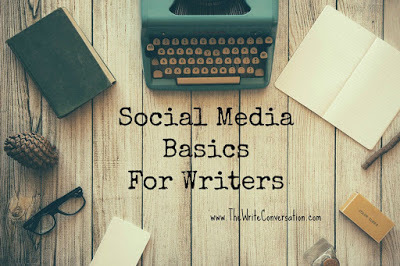 This is our first lesson in Hootsuite. This is the way I manage my social media in 30 minutes a day.
This is our first lesson in Hootsuite. This is the way I manage my social media in 30 minutes a day.If you're looking for links for previous posts in this series, they're now at the bottom of the post. Now onward with Hootsuite!
I get up every morning and go to my inbox (because that’s where I receive notifications of new blog posts and Internet articles). I look through the posts and decide what my audience will find valuable.
Then, several times a day (about every hour or hour-and-a-half) I check my Hootsuite account to see if anyone has mentioned me, or answered a question. I can rejoin the conversation and have meaningful dialogue without being chained to the Internet all day.
Now, the best way to explain how to set up Hootsuite is to walk you through it, step by step. Set Up Your Account
First, go to www.Hootsuite.com and set up a FREE, personal account. Start with a free account and if you need more, you can move to the paid version. For most, the free account does everything needed. The only difference between the paid and free version is how many platforms you can have. The free version offers 3, the paid offers many more.
Once you have that done, you can move on to the steps below.
Adding Social NetworksAdding additional social networks to your Hootsuite page is simple. All you need to do is click on your picture in the sidebar. This will give you the menu pictured in the screenshot below.

You can see that I currently have one Twitter profile, three Facebook profiles, and one Google + profile. If I wanted to add a profile, I’d first have to delete one of these because the free version of Hootsuite only allows you five profiles.
Deleting a profile is also simple. Click on a profile and a COG icon appears. Click the COG icon and you’ll get the dropdown menu you see pictured in the screenshot below when I clicked on the BLUE RIDGE MOUNTAINS profile.

One other thing you can do with this dropdown menu is SYNC AVATAR. Your avatar is the picture that appears with a particular social media profile. You’ll notice on the screenshot above that my Facebook Author Profile, doesn’t have a picture. For some reason, it disappeared. All I had to do to get it to reappear was to click on SYNC AVATAR.
Personalizing StreamsAnother one of my favorite options in Hootsuite is the ability to decide what streams I want and where I want them. For those not familiar with Hootsuite, a stream is a column of information. It can be from any of your social media profiles, Twitter, Facebook. LinkedIn, Google +, whichever you choose. Below is a screenshot of how I have my first three streams set up.

As you can see, the first three streams I have are:My main Twitter feed.A mention column that tells me when someone mentions me on Twitter.All my scheduled social media updates.
Here’s how to customize which streams you have show up on your page. There is a limit on the number of streams you can have on a Hootsuite tab. You can only have ten. But personally, I don’t find a need for near that many.
To customize your streams, you’ll first click on ADD STREAM. This will bring up a pop-up window. You can see mine in the screenshot below.

You can customize your streams within each of your social media profiles (Twitter, Facebook, etc) You can also do a search for a topic or keyword, and you can compose a list within this application. I recommend you take time to play around with this part of Hootsuite to get familiar with the hundreds of combinations and options.
You can change the order your streams appear on the screen by clicking on the blue header at the top of the stream and dragging them where you want them to go.
And, if you decide you no longer want a specific stream, click on the arrow on the right corner of the stream’s blue header and choose DELETE STREAM.
With these basics, you’ll be able to personalize your Hootsuite page to make interacting on different social media networks simpler.
Now it’s your turn. Ask any questions you have in the comments section and also let us in on any tips you have when managing your Hootsuite account.
Don’t forget to join the conversation!Blessings,Edie
TWEETABLES
Growing your #socialmedia presence shouldn't take more that 30 min a day - @EdieMelson (Click to Tweet)
How to accomplish #socialmedia in 30 minutes a day? @EdieMelson shares her secret. (Click to Tweet)
Previous posts in this series:
Part I—Know Where You are and Where You’re GoingPart II—When Should a Writer Start Building a Social Media NetworkPart III—Targeting Millennials: Snapchat’s 3 Most Dominant Brands & Their Tactics Part IV—Dealing with Facebook SpamPart V—How to Use Hashtags in Social Media
Part VI—Is Twitter Worth the Bother?
Published on July 20, 2015 03:36
July 18, 2015
Just Because! A Social Media Image to Share & Who Won the Barnes & Noble Gift Card
by Edie Melson @EdieMelson
I am convinced that I have the most wonderful husband in the world. Last week he walked in from running errands and handed my a bouquet of flowers—just because! I thought they were so beautiful I wanted to share them with all of you!
 I would not wish any companion in the world but you. -William Shakespeare
I would not wish any companion in the world but you. -William Shakespeare
Share a time when someone did something special for you—just because!
I also invite you to use this image any way you like online. Post it to your blog, share it on Facebook, Twitter, Pinterest, anywhere you'd like. All I ask is that you keep it intact, with my website watermark visible.
Don't forget to join the conversation!Blessings,Edie
And speaking of Just Because.
The Winner of the Barnes and Noble $15 gift card from the June 30, While My Soldier Serves Social Media Blast is . . .
AMANDA GARNER!
And the winners of the patriotic reusable shopping bags are . . .
J.L. Callison Beth Vogt
Amanda, J.L., and Beth, please email me at ediegmelson (at) gmail (dot) comso I can send you your gifts!
And thank you all for making it the BEST book signing ever!
Blessings,Edie
I am convinced that I have the most wonderful husband in the world. Last week he walked in from running errands and handed my a bouquet of flowers—just because! I thought they were so beautiful I wanted to share them with all of you!
 I would not wish any companion in the world but you. -William Shakespeare
I would not wish any companion in the world but you. -William ShakespeareShare a time when someone did something special for you—just because!
I also invite you to use this image any way you like online. Post it to your blog, share it on Facebook, Twitter, Pinterest, anywhere you'd like. All I ask is that you keep it intact, with my website watermark visible.
Don't forget to join the conversation!Blessings,Edie
And speaking of Just Because.
The Winner of the Barnes and Noble $15 gift card from the June 30, While My Soldier Serves Social Media Blast is . . .
AMANDA GARNER!
And the winners of the patriotic reusable shopping bags are . . .
J.L. Callison Beth Vogt
Amanda, J.L., and Beth, please email me at ediegmelson (at) gmail (dot) comso I can send you your gifts!
And thank you all for making it the BEST book signing ever!
Blessings,Edie
Published on July 18, 2015 01:00
July 17, 2015
Confronting Your Bad Reviews
by Warren Adler @WarrenAdler
 Every serious novelist worth their salt believes in their soul that they have written a brilliant novel or multiple novels in which the reader will find compelling characters engaged in deeply imagined stories that profoundly illustrate the human condition.
Every serious novelist worth their salt believes in their soul that they have written a brilliant novel or multiple novels in which the reader will find compelling characters engaged in deeply imagined stories that profoundly illustrate the human condition.
What every novelist, traditionally or self-published, yearns for is for others to be moved by their work, to be praised, acclaimed, recognized and celebrated for what they truly believe is their masterful artistic performance.
Of course, they might deny such a characterization and offer the explanation that it is the only the work itself that matters to the true artist. And while such a conviction does have the ring of truth, human vanity and the power of the ego is too deeply embedded in the psyche to be denied.
With that thought in mind, how does a novelist whose work is presented to the scrutiny of allegedly influential reviewers react to those who trash their book?
 Think of the horror of being on the receiving end of such reviews after perhaps years of composition and effort. What must this do to the authors aspirations, vanity, self-worth, and, in a practical sense, sales, career hopes and, of course, legacy? The serious novelist believes in their gut that their work is deserving of acceptance and hopefully adulation, commendation, prizes and awards, perhaps immortality and, of course, sales.
Think of the horror of being on the receiving end of such reviews after perhaps years of composition and effort. What must this do to the authors aspirations, vanity, self-worth, and, in a practical sense, sales, career hopes and, of course, legacy? The serious novelist believes in their gut that their work is deserving of acceptance and hopefully adulation, commendation, prizes and awards, perhaps immortality and, of course, sales.
I am reminded of the raw horror of such disdain by the experience of the novelist Theodore Weesner who died recently and whose first novel The Car Thief, a coming of age story, was excerpted and acclaimed by The New Yorker, Esquire and The Atlantic Monthly and cited by reviewers as brilliant and original. It was published in 1972.
He enjoyed years of prestige and received decent reviews for his other novels and years of teaching at various prestigious universities. Admittedly, he did not achieve the continued adulation and respect he had wished for, often acknowledged, after his brief spurt of literary celebrity, as a fine but largely unsung novelist.
But it was the letter he wrote to The New York Times book review after a tepid review of his novel The True Detective that illustrates the real agony of the disappointed artist and a cautionary tale of the dangers of putting too much faith in the opinion of others.
The Times Book Review, in its inimitable arrogance published Mr.Weesner’s letter, which I will quote in full:
“The book in question is one I worked on for more than five years and it came alive and does work—it is relevant and it is compelling...and the responses I’ve received from others have been genuine, extravagant, even passionate. Yet you chose to give it a short inconspicuously placed and—I just cannot deal with this—your reviewer did not even understand what he read. I repeat—your reviewer did not even understand what he read. And he printed it. You break my heart. You owe me much more than an apology.”
In essence, Mr. Weesner spoke for most novelists. It is the agonizing cry of all artists who present themselves naked and alone to a most indifferent and dismissive public.
There is a lesson here for all of us novelists who pursue our writing endeavors. Firstly, understand that all novelists had their share of bruises.
Here are some examples from an age where books were pervasive and did not have the technological abstractions they do today:
The Saturday Review, London cited Charles Dickens this way. “We do not believe in the permanence of his reputation.”
Le Figaro’s reviewer said of Gustave Flaubert, author of the immortal Madame Bovary, “Monsieur is not a writer.”
The eminent critic Clifton Fadiman in one of his reviews of William Faulkner’s novel called it. “The final blowup of what was once a remarkable, if minor talent.
The literary goddess Virginia Woolf wrote of James Joyce, “I finished Ulysses and think it is a misfire.”
The Southern Quarterly declared that Herman Melville’s Moby Dick is “sad stuff, dull and dreary and ridiculous.”
And a legendary German critic cited Thomas Mann’s Buddenbrooksas a “worthless story of worthless people in worthless chatter.”
And this one by one of the great British literary critics about George Orwell “1984 is a failure.
I cannot fail to mention the opinion of the works of two of America’s greatest literary icons. The editor of Bookman said this about Mark Twain. “A hundred years from now it is very likely that of Twain’s works: “The Jumping Frog alone will be remembered.” And a London critic said of Walt Whitman “Walt Whitman is as unacquainted with art as a hog is with mathematics.”
I cite here a few examples gleaned from The Experts Speak by Christopher Cerf and Victor Navasky.
The lesson to be learned by anyone who chooses any artistic endeavor in today’s world where criticism is ubiquitous and mostly indiscriminate: It is a great achievement just to be noticed.
Everybody has opinions. Consensus has become a major miracle. Technology has given everyone a voice. No one can predict the future. Bad reviews, bad opinions, insults, verbal abuse, diminishment, jealousy, frustration, along with effusive praise come with the territory. In today’s environment celebrate you’re being noticed and, whatever is said about you and your work, be sure your name is spelled right.
Besides, good reviews are not necessarily a harbinger of future success. In our contemporary world everything passes at warp speed. Here today, forgotten in a wink. I’ll go with the folks who say that investing passion and creative energy into the work is everything. The real trick is to just keep at it. Do your best and stop complaining.
Mr. Weesner had his say. Good for him.
I read it in his obituary in the New York Times, of all places.
TWEETABLES
Confronting your bad reviews - great American novelist @WarrenAdler offers perspective (Click to Tweet)
 Warren Adler is best known for The War of the Roses, his masterpiece fictionalization of a macabre divorce turned into the Golden Globe and BAFTA nominated dark comedy hit starring Michael Douglas, Kathleen Turner and Danny DeVito. Adler's international hit stage adaptation of the novel will premiere on Broadway in 2015-2016. Adler has also optioned and sold film rights for a number of his works including Random Hearts (starring Harrison Ford and Kristen Scott Thomas) and The Sunset Gang (produced by Linda Lavin for PBS' American Playhouse series starring Jerry Stiller, Uta Hagen, Harold Gould and Doris Roberts). In recent development are the Broadway Production of The War of the Roses, to be produced by Jay and Cindy Gutterman, The War of the Roses - The Children (Grey Eagle Films and Permut Presentations), a feature film adaptation of the sequel to Adler's iconic divorce story, Target Churchill (Grey Eagle Films and Solution Entertainment),Mourning Glory, to be adapted by Karen Leigh Hopkins, and Capitol Crimes (Grey Eagle Films and Sennet Entertainment), a television series based on his Fiona Fitzgerald mystery series. Warren Adler's newest thriller, Treadmill, is officially available.
Warren Adler is best known for The War of the Roses, his masterpiece fictionalization of a macabre divorce turned into the Golden Globe and BAFTA nominated dark comedy hit starring Michael Douglas, Kathleen Turner and Danny DeVito. Adler's international hit stage adaptation of the novel will premiere on Broadway in 2015-2016. Adler has also optioned and sold film rights for a number of his works including Random Hearts (starring Harrison Ford and Kristen Scott Thomas) and The Sunset Gang (produced by Linda Lavin for PBS' American Playhouse series starring Jerry Stiller, Uta Hagen, Harold Gould and Doris Roberts). In recent development are the Broadway Production of The War of the Roses, to be produced by Jay and Cindy Gutterman, The War of the Roses - The Children (Grey Eagle Films and Permut Presentations), a feature film adaptation of the sequel to Adler's iconic divorce story, Target Churchill (Grey Eagle Films and Solution Entertainment),Mourning Glory, to be adapted by Karen Leigh Hopkins, and Capitol Crimes (Grey Eagle Films and Sennet Entertainment), a television series based on his Fiona Fitzgerald mystery series. Warren Adler's newest thriller, Treadmill, is officially available.
 Every serious novelist worth their salt believes in their soul that they have written a brilliant novel or multiple novels in which the reader will find compelling characters engaged in deeply imagined stories that profoundly illustrate the human condition.
Every serious novelist worth their salt believes in their soul that they have written a brilliant novel or multiple novels in which the reader will find compelling characters engaged in deeply imagined stories that profoundly illustrate the human condition.What every novelist, traditionally or self-published, yearns for is for others to be moved by their work, to be praised, acclaimed, recognized and celebrated for what they truly believe is their masterful artistic performance.
Of course, they might deny such a characterization and offer the explanation that it is the only the work itself that matters to the true artist. And while such a conviction does have the ring of truth, human vanity and the power of the ego is too deeply embedded in the psyche to be denied.
With that thought in mind, how does a novelist whose work is presented to the scrutiny of allegedly influential reviewers react to those who trash their book?
 Think of the horror of being on the receiving end of such reviews after perhaps years of composition and effort. What must this do to the authors aspirations, vanity, self-worth, and, in a practical sense, sales, career hopes and, of course, legacy? The serious novelist believes in their gut that their work is deserving of acceptance and hopefully adulation, commendation, prizes and awards, perhaps immortality and, of course, sales.
Think of the horror of being on the receiving end of such reviews after perhaps years of composition and effort. What must this do to the authors aspirations, vanity, self-worth, and, in a practical sense, sales, career hopes and, of course, legacy? The serious novelist believes in their gut that their work is deserving of acceptance and hopefully adulation, commendation, prizes and awards, perhaps immortality and, of course, sales.I am reminded of the raw horror of such disdain by the experience of the novelist Theodore Weesner who died recently and whose first novel The Car Thief, a coming of age story, was excerpted and acclaimed by The New Yorker, Esquire and The Atlantic Monthly and cited by reviewers as brilliant and original. It was published in 1972.
He enjoyed years of prestige and received decent reviews for his other novels and years of teaching at various prestigious universities. Admittedly, he did not achieve the continued adulation and respect he had wished for, often acknowledged, after his brief spurt of literary celebrity, as a fine but largely unsung novelist.
But it was the letter he wrote to The New York Times book review after a tepid review of his novel The True Detective that illustrates the real agony of the disappointed artist and a cautionary tale of the dangers of putting too much faith in the opinion of others.
The Times Book Review, in its inimitable arrogance published Mr.Weesner’s letter, which I will quote in full:
“The book in question is one I worked on for more than five years and it came alive and does work—it is relevant and it is compelling...and the responses I’ve received from others have been genuine, extravagant, even passionate. Yet you chose to give it a short inconspicuously placed and—I just cannot deal with this—your reviewer did not even understand what he read. I repeat—your reviewer did not even understand what he read. And he printed it. You break my heart. You owe me much more than an apology.”
In essence, Mr. Weesner spoke for most novelists. It is the agonizing cry of all artists who present themselves naked and alone to a most indifferent and dismissive public.
There is a lesson here for all of us novelists who pursue our writing endeavors. Firstly, understand that all novelists had their share of bruises.
Here are some examples from an age where books were pervasive and did not have the technological abstractions they do today:
The Saturday Review, London cited Charles Dickens this way. “We do not believe in the permanence of his reputation.”
Le Figaro’s reviewer said of Gustave Flaubert, author of the immortal Madame Bovary, “Monsieur is not a writer.”
The eminent critic Clifton Fadiman in one of his reviews of William Faulkner’s novel called it. “The final blowup of what was once a remarkable, if minor talent.
The literary goddess Virginia Woolf wrote of James Joyce, “I finished Ulysses and think it is a misfire.”
The Southern Quarterly declared that Herman Melville’s Moby Dick is “sad stuff, dull and dreary and ridiculous.”
And a legendary German critic cited Thomas Mann’s Buddenbrooksas a “worthless story of worthless people in worthless chatter.”
And this one by one of the great British literary critics about George Orwell “1984 is a failure.
I cannot fail to mention the opinion of the works of two of America’s greatest literary icons. The editor of Bookman said this about Mark Twain. “A hundred years from now it is very likely that of Twain’s works: “The Jumping Frog alone will be remembered.” And a London critic said of Walt Whitman “Walt Whitman is as unacquainted with art as a hog is with mathematics.”
I cite here a few examples gleaned from The Experts Speak by Christopher Cerf and Victor Navasky.
The lesson to be learned by anyone who chooses any artistic endeavor in today’s world where criticism is ubiquitous and mostly indiscriminate: It is a great achievement just to be noticed.
Everybody has opinions. Consensus has become a major miracle. Technology has given everyone a voice. No one can predict the future. Bad reviews, bad opinions, insults, verbal abuse, diminishment, jealousy, frustration, along with effusive praise come with the territory. In today’s environment celebrate you’re being noticed and, whatever is said about you and your work, be sure your name is spelled right.
Besides, good reviews are not necessarily a harbinger of future success. In our contemporary world everything passes at warp speed. Here today, forgotten in a wink. I’ll go with the folks who say that investing passion and creative energy into the work is everything. The real trick is to just keep at it. Do your best and stop complaining.
Mr. Weesner had his say. Good for him.
I read it in his obituary in the New York Times, of all places.
TWEETABLES
Confronting your bad reviews - great American novelist @WarrenAdler offers perspective (Click to Tweet)
 Warren Adler is best known for The War of the Roses, his masterpiece fictionalization of a macabre divorce turned into the Golden Globe and BAFTA nominated dark comedy hit starring Michael Douglas, Kathleen Turner and Danny DeVito. Adler's international hit stage adaptation of the novel will premiere on Broadway in 2015-2016. Adler has also optioned and sold film rights for a number of his works including Random Hearts (starring Harrison Ford and Kristen Scott Thomas) and The Sunset Gang (produced by Linda Lavin for PBS' American Playhouse series starring Jerry Stiller, Uta Hagen, Harold Gould and Doris Roberts). In recent development are the Broadway Production of The War of the Roses, to be produced by Jay and Cindy Gutterman, The War of the Roses - The Children (Grey Eagle Films and Permut Presentations), a feature film adaptation of the sequel to Adler's iconic divorce story, Target Churchill (Grey Eagle Films and Solution Entertainment),Mourning Glory, to be adapted by Karen Leigh Hopkins, and Capitol Crimes (Grey Eagle Films and Sennet Entertainment), a television series based on his Fiona Fitzgerald mystery series. Warren Adler's newest thriller, Treadmill, is officially available.
Warren Adler is best known for The War of the Roses, his masterpiece fictionalization of a macabre divorce turned into the Golden Globe and BAFTA nominated dark comedy hit starring Michael Douglas, Kathleen Turner and Danny DeVito. Adler's international hit stage adaptation of the novel will premiere on Broadway in 2015-2016. Adler has also optioned and sold film rights for a number of his works including Random Hearts (starring Harrison Ford and Kristen Scott Thomas) and The Sunset Gang (produced by Linda Lavin for PBS' American Playhouse series starring Jerry Stiller, Uta Hagen, Harold Gould and Doris Roberts). In recent development are the Broadway Production of The War of the Roses, to be produced by Jay and Cindy Gutterman, The War of the Roses - The Children (Grey Eagle Films and Permut Presentations), a feature film adaptation of the sequel to Adler's iconic divorce story, Target Churchill (Grey Eagle Films and Solution Entertainment),Mourning Glory, to be adapted by Karen Leigh Hopkins, and Capitol Crimes (Grey Eagle Films and Sennet Entertainment), a television series based on his Fiona Fitzgerald mystery series. Warren Adler's newest thriller, Treadmill, is officially available.
Published on July 17, 2015 01:00
July 16, 2015
5 Ways to Survive the Christian Fiction Downturn
Edie here. Today I'm really excited to introduce you to the newest member of The Write Conversation Blogging Team, Cyle Young. Cyle is an award-winning author with his own amazing collaborative writing site, Almost An Author. So join me in welcoming him to the group!
5 Ways to Survive the Christian Fiction Downturn
by Cyle Young @CyleYoung
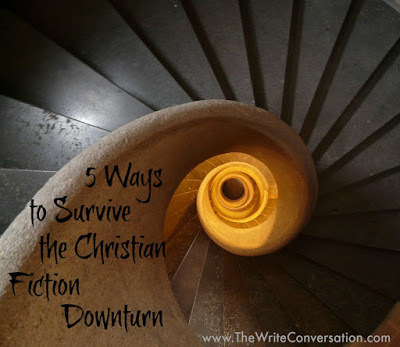 The internet has been abuzz recently with the recent closing of Abingdon Press’s fiction division.
The internet has been abuzz recently with the recent closing of Abingdon Press’s fiction division.
Publishers and agents everywhere are grasping to understand the economic impact of that change. Christian fiction authors are left to ponder what place they can hold in an ever-diminishing CBA fiction market.
But as disheartening as the news is for fiction authors in the CBA, there’s a small light at the end of the tunnel. Publishers are still publishing Christian fiction—this isn’t the apocalypse.
If you are a Christian fiction writer, here are 5 ways you can “roll with the punches”, and adjust to the recent changes in the CBA.Survival TipsTrainIn all truth, the Christian market hasn’t gone away. Nielsen BookScan revealed that the Christian Fiction market decreased 15% from 2013-2014. What is left, is a narrow highly-competitive market.
Today’s Christian author can’t rest on his or her laurels. The state of the market is such that good writers may become passed over for better or great writers. Authors who are constantly improving their craft are going to have a higher amount of success than those who don’t.
Some ideas to improve: invest in a writing course, go to writing conferences, challenge yourself to find a writing mentor who will push you onward in your ability.
Build your platform Build your platform.Take time away from your writing to focus on creating your own unique market for your books. Build your platform utilizing a website, blog, or social media. Expand your reach and grow your prospective audience while you gain influence with readers in your target audience.
Build your platform.Take time away from your writing to focus on creating your own unique market for your books. Build your platform utilizing a website, blog, or social media. Expand your reach and grow your prospective audience while you gain influence with readers in your target audience.
The truth is… When a publisher compares two books that are equal in every way, the one that belongs to the author with the biggest platform, is the one that’s going to get a contract.
Two great books on building platform: Edie Melson’s Connections:Social Media and Networking Techniques for Writers and Michael Hyatt’s Platform: Get Noticed In A Noisy World.
SpeakGet out and meet your readers. Visit book groups, speak at schools, keynote at conferences, teach at homeschool co-ops, or visit churches.
Be active and expand your ministry beyond the page. Get out and meet and/or create an audience and platform for your work. These experiences can open up new ideas for future books. It could also turn into a lucrative opportunity to provide for yourself while you wait to see what happens with the CBA fiction market.
Write Non-fiction Write non-fictionSome of the best non-fiction books I have ever read, were written by authors who used an amazing mastery of story in their writing.
Write non-fictionSome of the best non-fiction books I have ever read, were written by authors who used an amazing mastery of story in their writing.
One specific example that comes to mind, is Love Does by Bob Goff. Story after riveting story, his real-life stories pulled me in—deeper and deeper. I couldn’t put the book down—and it was non-fiction.
Maybe try your hand at writing a non-fiction book. Harness the storyteller in you and write a powerful and engaging non-fiction manuscript.
EditHave you ever heard the old saying, those that can’t write…edit? Well you might be able to write, but maybe God is offering you an opportunity to refocus on who you are as a writer.
If you have a love for all things grammar, words, syntax, plot, etc., then maybe you can spend time helping other writers improve their work. If you're a good enough editor, you may also be able to generate a steady stream of income from editing.
Whatever you do in this fiction downturn, just remember, "In everything there is a season." God has a plan and he hasn’t forgotten you, or your writing. Keep your chin up, and keep at it!
TWEETABLESNot all the news in #publishing is bad - tips to survive from @CyleYoung on @EdieMelson (Click to Tweet)
5 Ways to Survive the Christian Fiction Downturn - via @CyleYoung on @EdieMelson (Click to Tweet)
 Cyle Young is thankful God blessed him with the uniqueness of being an ADD-riddled…SQUIRREL!...binge writer. Not much unlike the classic video game Frogger, Cyle darts back and forth between various writing genres. He crafts princess children’s stories, how-to advice for parents, epic fantasy tales, and easy readers.
Cyle Young is thankful God blessed him with the uniqueness of being an ADD-riddled…SQUIRREL!...binge writer. Not much unlike the classic video game Frogger, Cyle darts back and forth between various writing genres. He crafts princess children’s stories, how-to advice for parents, epic fantasy tales, and easy readers.
Learn more about Cyle on his website www.cyleyoung.com. Or check him out on www.facebook.com/cyleyoung or www.twitter.com/cyleyoung.
5 Ways to Survive the Christian Fiction Downturn
by Cyle Young @CyleYoung
 The internet has been abuzz recently with the recent closing of Abingdon Press’s fiction division.
The internet has been abuzz recently with the recent closing of Abingdon Press’s fiction division. Publishers and agents everywhere are grasping to understand the economic impact of that change. Christian fiction authors are left to ponder what place they can hold in an ever-diminishing CBA fiction market.
But as disheartening as the news is for fiction authors in the CBA, there’s a small light at the end of the tunnel. Publishers are still publishing Christian fiction—this isn’t the apocalypse.
If you are a Christian fiction writer, here are 5 ways you can “roll with the punches”, and adjust to the recent changes in the CBA.Survival TipsTrainIn all truth, the Christian market hasn’t gone away. Nielsen BookScan revealed that the Christian Fiction market decreased 15% from 2013-2014. What is left, is a narrow highly-competitive market.
Today’s Christian author can’t rest on his or her laurels. The state of the market is such that good writers may become passed over for better or great writers. Authors who are constantly improving their craft are going to have a higher amount of success than those who don’t.
Some ideas to improve: invest in a writing course, go to writing conferences, challenge yourself to find a writing mentor who will push you onward in your ability.
Build your platform
 Build your platform.Take time away from your writing to focus on creating your own unique market for your books. Build your platform utilizing a website, blog, or social media. Expand your reach and grow your prospective audience while you gain influence with readers in your target audience.
Build your platform.Take time away from your writing to focus on creating your own unique market for your books. Build your platform utilizing a website, blog, or social media. Expand your reach and grow your prospective audience while you gain influence with readers in your target audience.The truth is… When a publisher compares two books that are equal in every way, the one that belongs to the author with the biggest platform, is the one that’s going to get a contract.
Two great books on building platform: Edie Melson’s Connections:Social Media and Networking Techniques for Writers and Michael Hyatt’s Platform: Get Noticed In A Noisy World.
SpeakGet out and meet your readers. Visit book groups, speak at schools, keynote at conferences, teach at homeschool co-ops, or visit churches.
Be active and expand your ministry beyond the page. Get out and meet and/or create an audience and platform for your work. These experiences can open up new ideas for future books. It could also turn into a lucrative opportunity to provide for yourself while you wait to see what happens with the CBA fiction market.
Write Non-fiction
 Write non-fictionSome of the best non-fiction books I have ever read, were written by authors who used an amazing mastery of story in their writing.
Write non-fictionSome of the best non-fiction books I have ever read, were written by authors who used an amazing mastery of story in their writing. One specific example that comes to mind, is Love Does by Bob Goff. Story after riveting story, his real-life stories pulled me in—deeper and deeper. I couldn’t put the book down—and it was non-fiction.
Maybe try your hand at writing a non-fiction book. Harness the storyteller in you and write a powerful and engaging non-fiction manuscript.
EditHave you ever heard the old saying, those that can’t write…edit? Well you might be able to write, but maybe God is offering you an opportunity to refocus on who you are as a writer.
If you have a love for all things grammar, words, syntax, plot, etc., then maybe you can spend time helping other writers improve their work. If you're a good enough editor, you may also be able to generate a steady stream of income from editing.
Whatever you do in this fiction downturn, just remember, "In everything there is a season." God has a plan and he hasn’t forgotten you, or your writing. Keep your chin up, and keep at it!
TWEETABLESNot all the news in #publishing is bad - tips to survive from @CyleYoung on @EdieMelson (Click to Tweet)
5 Ways to Survive the Christian Fiction Downturn - via @CyleYoung on @EdieMelson (Click to Tweet)
 Cyle Young is thankful God blessed him with the uniqueness of being an ADD-riddled…SQUIRREL!...binge writer. Not much unlike the classic video game Frogger, Cyle darts back and forth between various writing genres. He crafts princess children’s stories, how-to advice for parents, epic fantasy tales, and easy readers.
Cyle Young is thankful God blessed him with the uniqueness of being an ADD-riddled…SQUIRREL!...binge writer. Not much unlike the classic video game Frogger, Cyle darts back and forth between various writing genres. He crafts princess children’s stories, how-to advice for parents, epic fantasy tales, and easy readers.Learn more about Cyle on his website www.cyleyoung.com. Or check him out on www.facebook.com/cyleyoung or www.twitter.com/cyleyoung.
Published on July 16, 2015 01:00
July 15, 2015
Writing a Devotion that Sings
by Katy Kauffman @KatyKauffman28
 Writing a Devotions that SingsIf a great composer took your writing and set it to music, what would its melody be? Our writing emits a song of its own. It could be the thunderous, foreboding tones of a warning; the quick tempo of a call to action; or the soothing notes of a comforting message.
Writing a Devotions that SingsIf a great composer took your writing and set it to music, what would its melody be? Our writing emits a song of its own. It could be the thunderous, foreboding tones of a warning; the quick tempo of a call to action; or the soothing notes of a comforting message.
What song do you want your writing to sing?
Crafting the right “song” depends on your message and your audience. Whether you’re writing a devotion for a blog or a book, always remember who you are writing to and why. Do you want to comfort? Instruct? Warn? Encourage? Select the right “lyrics”—the right wording—and pair them with the right “notes”—style or voice. As a writer, you are composing not only a message, but its presentation. So compose wisely.
Consider this “composition.” Do you hear the music in this sentence?
God is bigger than the spiritual enemies we face.
But suppose you want to emphasize specific spiritual enemies.
 No matter what—God is greater.“No matter how fierce the enemy seems—when fear cripples us, anger enrages us, or selfishness possesses us; when adversity crushes us, opposition hounds us, or temptation plagues us—God is greater.”
2 Timothy: Winning the Victory
No matter what—God is greater.“No matter how fierce the enemy seems—when fear cripples us, anger enrages us, or selfishness possesses us; when adversity crushes us, opposition hounds us, or temptation plagues us—God is greater.”
2 Timothy: Winning the Victory
That second sentence took a lot of thought for my first Bible study. I wanted to identify specific spiritual enemies that we all deal with and present them in a way that showed their true nature. Fear cripples, selfishness possesses, and adversity crushes. When you look for the right wording, or lyrics, for your devotion, use descriptive verbs that need no adverbs, and always keep a thesaurus nearby. I don’t know how many times I used the dictionary and thesaurus on my computer as I hunted for just the right words to put in my book.
Also consider the tempo of that line from 2 Timothy: Winning the Victory . The phrases in between the em dashes have the same beat—subject-verb-object. They end with a crescendo—God is greater. As you write, remember that your sentences have a cadence, a beat that reverberates in the reader’s mind. Use that to your advantage to leave a lasting impression of the message you are declaring and the truth you are trumpeting.
When I first started writing, my work sounded like some of the books I read in college—dry and academic. My writing needed to be infused with vibrancy, lyricism, and musicality. Although I could tell which sentences were flat and which were vibrant, it took time to develop the skill to craft a musical sentence. Just as musicians constantly grow in the arts, we grow as writers in our craft. So practice. Write down some sentences on a particular topic, and work with their lyricism and rhythm. Don’t stop tweaking them until you hear the beautiful music that will touch the reader’s soul and stir their will to action. You’re a composer. Don’t forget it.
Have you noticed how your writing is growing and changing? Share a sentence or two below that you're proud of. (I know it's hard to "brag" but we all need to take joy on the words God gives us!)
Don't forget to join the conversation!
TWEETABLE
#Writing a devotion that sings - insights from author @KatyKauffman28 on @EdieMelson (Click to Tweet)
 Katy Kauffman is an award-winning writer and a co-founder of Lighthouse Bible Studies, a ministry which seeks to connect people to God through His Word. She has taught the Bible to women and teens, and has two published Bible studies for women, 2 Timothy: Winning the Victory and Faith, Courage, and Victory. Her heart’s desire is for women to know and love God, understand the richness of His Word, and fulfill His plan for their lives. Katy is also the designer of Broken but Priceless: The Magazine. She makes her home near Atlanta, Georgia. Connect with her further on Facebook and Twitter.
Katy Kauffman is an award-winning writer and a co-founder of Lighthouse Bible Studies, a ministry which seeks to connect people to God through His Word. She has taught the Bible to women and teens, and has two published Bible studies for women, 2 Timothy: Winning the Victory and Faith, Courage, and Victory. Her heart’s desire is for women to know and love God, understand the richness of His Word, and fulfill His plan for their lives. Katy is also the designer of Broken but Priceless: The Magazine. She makes her home near Atlanta, Georgia. Connect with her further on Facebook and Twitter.
 Writing a Devotions that SingsIf a great composer took your writing and set it to music, what would its melody be? Our writing emits a song of its own. It could be the thunderous, foreboding tones of a warning; the quick tempo of a call to action; or the soothing notes of a comforting message.
Writing a Devotions that SingsIf a great composer took your writing and set it to music, what would its melody be? Our writing emits a song of its own. It could be the thunderous, foreboding tones of a warning; the quick tempo of a call to action; or the soothing notes of a comforting message. What song do you want your writing to sing?
Crafting the right “song” depends on your message and your audience. Whether you’re writing a devotion for a blog or a book, always remember who you are writing to and why. Do you want to comfort? Instruct? Warn? Encourage? Select the right “lyrics”—the right wording—and pair them with the right “notes”—style or voice. As a writer, you are composing not only a message, but its presentation. So compose wisely.
Consider this “composition.” Do you hear the music in this sentence?
God is bigger than the spiritual enemies we face.
But suppose you want to emphasize specific spiritual enemies.
 No matter what—God is greater.“No matter how fierce the enemy seems—when fear cripples us, anger enrages us, or selfishness possesses us; when adversity crushes us, opposition hounds us, or temptation plagues us—God is greater.”
2 Timothy: Winning the Victory
No matter what—God is greater.“No matter how fierce the enemy seems—when fear cripples us, anger enrages us, or selfishness possesses us; when adversity crushes us, opposition hounds us, or temptation plagues us—God is greater.”
2 Timothy: Winning the Victory
That second sentence took a lot of thought for my first Bible study. I wanted to identify specific spiritual enemies that we all deal with and present them in a way that showed their true nature. Fear cripples, selfishness possesses, and adversity crushes. When you look for the right wording, or lyrics, for your devotion, use descriptive verbs that need no adverbs, and always keep a thesaurus nearby. I don’t know how many times I used the dictionary and thesaurus on my computer as I hunted for just the right words to put in my book.
Also consider the tempo of that line from 2 Timothy: Winning the Victory . The phrases in between the em dashes have the same beat—subject-verb-object. They end with a crescendo—God is greater. As you write, remember that your sentences have a cadence, a beat that reverberates in the reader’s mind. Use that to your advantage to leave a lasting impression of the message you are declaring and the truth you are trumpeting.
When I first started writing, my work sounded like some of the books I read in college—dry and academic. My writing needed to be infused with vibrancy, lyricism, and musicality. Although I could tell which sentences were flat and which were vibrant, it took time to develop the skill to craft a musical sentence. Just as musicians constantly grow in the arts, we grow as writers in our craft. So practice. Write down some sentences on a particular topic, and work with their lyricism and rhythm. Don’t stop tweaking them until you hear the beautiful music that will touch the reader’s soul and stir their will to action. You’re a composer. Don’t forget it.
Have you noticed how your writing is growing and changing? Share a sentence or two below that you're proud of. (I know it's hard to "brag" but we all need to take joy on the words God gives us!)
Don't forget to join the conversation!
TWEETABLE
#Writing a devotion that sings - insights from author @KatyKauffman28 on @EdieMelson (Click to Tweet)
 Katy Kauffman is an award-winning writer and a co-founder of Lighthouse Bible Studies, a ministry which seeks to connect people to God through His Word. She has taught the Bible to women and teens, and has two published Bible studies for women, 2 Timothy: Winning the Victory and Faith, Courage, and Victory. Her heart’s desire is for women to know and love God, understand the richness of His Word, and fulfill His plan for their lives. Katy is also the designer of Broken but Priceless: The Magazine. She makes her home near Atlanta, Georgia. Connect with her further on Facebook and Twitter.
Katy Kauffman is an award-winning writer and a co-founder of Lighthouse Bible Studies, a ministry which seeks to connect people to God through His Word. She has taught the Bible to women and teens, and has two published Bible studies for women, 2 Timothy: Winning the Victory and Faith, Courage, and Victory. Her heart’s desire is for women to know and love God, understand the richness of His Word, and fulfill His plan for their lives. Katy is also the designer of Broken but Priceless: The Magazine. She makes her home near Atlanta, Georgia. Connect with her further on Facebook and Twitter.
Published on July 15, 2015 01:00
July 14, 2015
Overcoming the Fear of Writing Failure
by Cindy Sproles @CindyDevoted
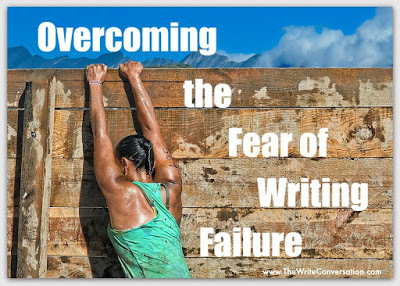 Overcoming the fear of writing failure."So Mom, how's book two coming?" My son's voice echoed through the phone. "Mom. You there?"
Overcoming the fear of writing failure."So Mom, how's book two coming?" My son's voice echoed through the phone. "Mom. You there?"
"Uh, yep. I'm here. I have some ideas."
“That's never been a problem. How's the book coming?"
"I can't seem to get started?"
"Why?" He asked.
"I don't know."
"You got a story in mind?"
"Yes."
"Then just write it."
I'd stretched my fiction wings so far, the muscles ached and I was successful. Now I faced writing book two. The wooden door to my mind bolted shut.I’d worked hard to hone the craft of storytelling. Write, rewrite. And when my agent called to say, Success! I was ecstatic. The book released. Good reviews, good sales. Good story. Where's book two?
The wooden door to my mind bolted shut.I’d worked hard to hone the craft of storytelling. Write, rewrite. And when my agent called to say, Success! I was ecstatic. The book released. Good reviews, good sales. Good story. Where's book two?
Something took hold of me. It's fingers tightened around my throat and squeezed. Stories burst at the seams of my imagination, but for some reason the wooden door to my mind bolted shut. Regardless what words I penned, nothing worked.
The problem wasn't a lack of stories, or even ability or skill. It was good old-fashioned fear. When well-wishers continually asked, "So when is book two coming out?" I shrank into a pile of mush.
 Every writer experiences fear.Every writer experiences fear at one time or another. We work hard, attain a goal, then fear failure. The real question is how do we move past? It's not as easy as a few bullet points on a page. Moving past our fear is the same today as it was the day we decided to take our first step toward crafting a manuscript, a devotion, or an article.
Every writer experiences fear.Every writer experiences fear at one time or another. We work hard, attain a goal, then fear failure. The real question is how do we move past? It's not as easy as a few bullet points on a page. Moving past our fear is the same today as it was the day we decided to take our first step toward crafting a manuscript, a devotion, or an article.
Our ability hasn't changed. Our imagination hasn't halted. We've not forgotten how to spin a yarn. We simply fear failure. When we begin our career, failure didn't play into the game. The dream lay ahead, so we paddled upstream until we grasped hold of the prize. Once we accomplished the goal, it's easy to look back and see the obstacles nativity blinded us to. Now we see what can throw us off track and we grow afraid. So how do we move past?Take action: Take the step of just doing what you need to do. Inactivity is a breeding ground for failure. Write a paragraph, then a page, then a chapter. With each word your confidence will grow. As my son said, "Just write it."Ask the question, What if I don't do this? What if's are scary, but if you love writing, then asking this one "what if" question should help get you back on track. Writers write, because we have too. We can't NOT write. When I asked myself this question, my palms grew sweaty, I began to pace, and I realized, I would be miserable if I didn't write. It's a need in my life and my guess is. . .it's a need in yours as well.Reach out to your peers: There's nothing like the community of writers. We all understand what no one else in the world "gets" about us. Writers understand writer's block, misspelled words, comma queens, and yes . . . fear. Contact your peers, spill your guts, and then let them spin you around and put their foot in your rear. It's nice to have the affirmation from your peers that you are a good writer, and it's nicer when you know they believe in you enough to shove you off the boat knowing when you hit the water . . . you'll swim.List your writing strengths: List the things you do well in your writing. Perhaps it's your voice or amazing descriptions. Maybe it's plotting skills, building angst, or character development. Remind yourself what you do well, and then do it.
Every article, every book, or poem may not be successful. But that's okay. It's what grooms us to be better writers and what reels us in from being haughty. The one thing that will ruin a writing career quickly, is succumbing to fear. Step out. Regain your "newbie" ambition, and don't let fear take hold. You can do this because . . . you are a writer.
Since I know we all struggle with this, to one degree or another, what do you do to overcome fear? Be sure to leave your thoughts in the comments section below.
Don't forget to join the conversation!
TWEETABLESOvercoming the fear of #writing failure - tips from author @CindyDevoted on @EdieMelson (Click to Tweet)
We all fight a fear of #writing failure. Write through with tips from @CindyDevoted (Click to Tweet)
 Cindy Sproles is an author and popular speaker. She is the cofounder of Christian Devotions ministries and managing editor of Straight Street Books and SonRise Devotionals, imprints of Lighthouse Publishing of the Carolinas. Cindy is the executive editor of www.christiandevotions.us and www.inspireafire.com. She teaches at writers conferences nationwide and directs The Asheville Christian Writers Conference - Writers Boot Camp.
Cindy Sproles is an author and popular speaker. She is the cofounder of Christian Devotions ministries and managing editor of Straight Street Books and SonRise Devotionals, imprints of Lighthouse Publishing of the Carolinas. Cindy is the executive editor of www.christiandevotions.us and www.inspireafire.com. She teaches at writers conferences nationwide and directs The Asheville Christian Writers Conference - Writers Boot Camp.
She is the author of two devotionals, He Said, She Said - Learning to Live a Life of Passion and New Sheets - Thirty Days to Refine You into the Woman You Can Be. Cindy's debut novel, Mercy's Rain, is available at major retailers. Visit Cindy at www.cindysproles.com and book her for your next conference or ladies retreat. Also connect with her on Facebook and Twitter.
 Overcoming the fear of writing failure."So Mom, how's book two coming?" My son's voice echoed through the phone. "Mom. You there?"
Overcoming the fear of writing failure."So Mom, how's book two coming?" My son's voice echoed through the phone. "Mom. You there?""Uh, yep. I'm here. I have some ideas."
“That's never been a problem. How's the book coming?"
"I can't seem to get started?"
"Why?" He asked.
"I don't know."
"You got a story in mind?"
"Yes."
"Then just write it."
I'd stretched my fiction wings so far, the muscles ached and I was successful. Now I faced writing book two.
 The wooden door to my mind bolted shut.I’d worked hard to hone the craft of storytelling. Write, rewrite. And when my agent called to say, Success! I was ecstatic. The book released. Good reviews, good sales. Good story. Where's book two?
The wooden door to my mind bolted shut.I’d worked hard to hone the craft of storytelling. Write, rewrite. And when my agent called to say, Success! I was ecstatic. The book released. Good reviews, good sales. Good story. Where's book two?Something took hold of me. It's fingers tightened around my throat and squeezed. Stories burst at the seams of my imagination, but for some reason the wooden door to my mind bolted shut. Regardless what words I penned, nothing worked.
The problem wasn't a lack of stories, or even ability or skill. It was good old-fashioned fear. When well-wishers continually asked, "So when is book two coming out?" I shrank into a pile of mush.
 Every writer experiences fear.Every writer experiences fear at one time or another. We work hard, attain a goal, then fear failure. The real question is how do we move past? It's not as easy as a few bullet points on a page. Moving past our fear is the same today as it was the day we decided to take our first step toward crafting a manuscript, a devotion, or an article.
Every writer experiences fear.Every writer experiences fear at one time or another. We work hard, attain a goal, then fear failure. The real question is how do we move past? It's not as easy as a few bullet points on a page. Moving past our fear is the same today as it was the day we decided to take our first step toward crafting a manuscript, a devotion, or an article.Our ability hasn't changed. Our imagination hasn't halted. We've not forgotten how to spin a yarn. We simply fear failure. When we begin our career, failure didn't play into the game. The dream lay ahead, so we paddled upstream until we grasped hold of the prize. Once we accomplished the goal, it's easy to look back and see the obstacles nativity blinded us to. Now we see what can throw us off track and we grow afraid. So how do we move past?Take action: Take the step of just doing what you need to do. Inactivity is a breeding ground for failure. Write a paragraph, then a page, then a chapter. With each word your confidence will grow. As my son said, "Just write it."Ask the question, What if I don't do this? What if's are scary, but if you love writing, then asking this one "what if" question should help get you back on track. Writers write, because we have too. We can't NOT write. When I asked myself this question, my palms grew sweaty, I began to pace, and I realized, I would be miserable if I didn't write. It's a need in my life and my guess is. . .it's a need in yours as well.Reach out to your peers: There's nothing like the community of writers. We all understand what no one else in the world "gets" about us. Writers understand writer's block, misspelled words, comma queens, and yes . . . fear. Contact your peers, spill your guts, and then let them spin you around and put their foot in your rear. It's nice to have the affirmation from your peers that you are a good writer, and it's nicer when you know they believe in you enough to shove you off the boat knowing when you hit the water . . . you'll swim.List your writing strengths: List the things you do well in your writing. Perhaps it's your voice or amazing descriptions. Maybe it's plotting skills, building angst, or character development. Remind yourself what you do well, and then do it.
Every article, every book, or poem may not be successful. But that's okay. It's what grooms us to be better writers and what reels us in from being haughty. The one thing that will ruin a writing career quickly, is succumbing to fear. Step out. Regain your "newbie" ambition, and don't let fear take hold. You can do this because . . . you are a writer.
Since I know we all struggle with this, to one degree or another, what do you do to overcome fear? Be sure to leave your thoughts in the comments section below.
Don't forget to join the conversation!
TWEETABLESOvercoming the fear of #writing failure - tips from author @CindyDevoted on @EdieMelson (Click to Tweet)
We all fight a fear of #writing failure. Write through with tips from @CindyDevoted (Click to Tweet)
 Cindy Sproles is an author and popular speaker. She is the cofounder of Christian Devotions ministries and managing editor of Straight Street Books and SonRise Devotionals, imprints of Lighthouse Publishing of the Carolinas. Cindy is the executive editor of www.christiandevotions.us and www.inspireafire.com. She teaches at writers conferences nationwide and directs The Asheville Christian Writers Conference - Writers Boot Camp.
Cindy Sproles is an author and popular speaker. She is the cofounder of Christian Devotions ministries and managing editor of Straight Street Books and SonRise Devotionals, imprints of Lighthouse Publishing of the Carolinas. Cindy is the executive editor of www.christiandevotions.us and www.inspireafire.com. She teaches at writers conferences nationwide and directs The Asheville Christian Writers Conference - Writers Boot Camp. She is the author of two devotionals, He Said, She Said - Learning to Live a Life of Passion and New Sheets - Thirty Days to Refine You into the Woman You Can Be. Cindy's debut novel, Mercy's Rain, is available at major retailers. Visit Cindy at www.cindysproles.com and book her for your next conference or ladies retreat. Also connect with her on Facebook and Twitter.
Published on July 14, 2015 01:00
July 13, 2015
Social Media Basics for Writers, Part VI—Is Twitter Worth the Bother?
by Edie Melson @EdieMelson
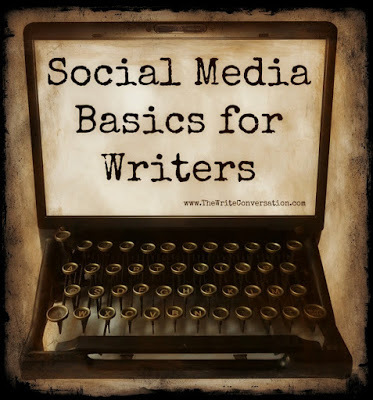 Social media basics for writers.Today I want to jump into one of the most important social media platforms, Twitter. But first, in case you've missed the previous posts, here are a list of them, with links.
Social media basics for writers.Today I want to jump into one of the most important social media platforms, Twitter. But first, in case you've missed the previous posts, here are a list of them, with links.
Part I—Know Where You are and Where You’re GoingPart II—When Should a Writer Start Building a Social Media NetworkPart III—Targeting Millennials: Snapchat’s 3 Most Dominant Brands & Their Tactics Part IV—Dealing with Facebook SpamPart V—Howto Use Hashtags in Social Media
3 Reasons to Master Twitter I remember the first time I ventured onto twitter. It’s an intimidating site, full of unfamiliar terms and strange rules. Beyond that, the more people I followed, the more confusing the newsfeed became. To my untrained eye, all those 140 character bursts were just disjointed and disconnected chaos.I really didn’t understand how anyone could get anything good out of this network.
Luckily for me, I didn’t give up. I kept digging for articles to help me understand the value of Twitter. And that’s when I began to unravel the Twitter chaos. As I became more familiar with this alien landscape, I began to appreciate why Twitter and writers are a perfect match. Twitter is a respecter of time.It respects our time.Interacting in 140 character bursts keeps conversations focused and moving quickly.It helps us write tight. If you’ve spent any time at all studying writing, you’ve heard the advice to write tight. This means eliminating unnecessary words.It’s a networking superconductor. There is no social media platform out there that is better at allowing us to find connections with like-minded people.
Twitter is a respecter of time.It respects our time.Interacting in 140 character bursts keeps conversations focused and moving quickly.It helps us write tight. If you’ve spent any time at all studying writing, you’ve heard the advice to write tight. This means eliminating unnecessary words.It’s a networking superconductor. There is no social media platform out there that is better at allowing us to find connections with like-minded people.
Tips to Make Valuable Connections1. Be sure to follow people back. It’s considered good manners to follow people back who follow you. This doesn’t mean you have to follow people who make you uncomfortable or who are trying to sell you 10,000 followers. Use common sense, but unless there’s a good reason be nice and follow people back.
 Don't protect your tweets2. Don’t PROTECT YOUR TWEETS. On your Twitter profile there’s the option to protect your tweets. This locks your account and doesn’t let people follow you unless you approve them. If you feel the need to protect your tweets, you really shouldn’t be on Twitter. This social media platform is a place to get found, not lurk.
Don't protect your tweets2. Don’t PROTECT YOUR TWEETS. On your Twitter profile there’s the option to protect your tweets. This locks your account and doesn’t let people follow you unless you approve them. If you feel the need to protect your tweets, you really shouldn’t be on Twitter. This social media platform is a place to get found, not lurk.
3. Make sure your 160 character ABOUT ME gives a good picture of who you are. You don’t want to over use hashtags here, but you do want to cover all the things you might tweet about and hashtags are a good shortcut for that. Here’s what I have as my description: Writer & Author—passionate for life's stories & God's path. #Militaryfamily blogger Guideposts.org #steampunk #vets #scifi #socialmedia4writers
4. Show your face.Always use a picture of YOURSELF as your Twitter icon. The evidence is overwhelming. People respond to a head shot where you can see the person’s smile. The only exception is if you have a business account. Then you can use your company’s logo.
 Have a regular presence on Twitter &be consistent.5. Have a regular presence on Twitter. I Tweet a lot more now than I did when I started out. More first goal was to Tweet four to six times each day, four or five days a week. I use Hootsuite to schedule my Tweets throughout the day. I’ll be covering Hootsuite next week, so don’t worry if you’re not familiar with a scheduling program. Just remember, Do NOT send out all your tweets at once. This is called hogging the stream and is the height of bad manners!
Have a regular presence on Twitter &be consistent.5. Have a regular presence on Twitter. I Tweet a lot more now than I did when I started out. More first goal was to Tweet four to six times each day, four or five days a week. I use Hootsuite to schedule my Tweets throughout the day. I’ll be covering Hootsuite next week, so don’t worry if you’re not familiar with a scheduling program. Just remember, Do NOT send out all your tweets at once. This is called hogging the stream and is the height of bad manners!
6. BE CONSISTENT with the subject of your tweets. I tweet about social media, writing, some books, and issues important to military families. Occasionally, I’ll find something that I just want to share outside of those topics, but that’s an exception, not the norm.
7. Make sure you’re sharing valuable content with your Twitter updates. Don’t make your Tweets all about you. Instead, promote others who have something valuable to say to your followers. I know it’s counter intuitive, but it works every time!
8. Look for strategic people to follow. Here’s what I mean. I’m working on a science fiction manuscript and trying to grow my Twitter followers for that specific market. To find new people to follow, I visit some of my favorite science fiction author’s profiles. Then I click on their followers. This does two things.1. It gives me people to follow who are interested in following a scifi author.2. It gives me a good chance of them following me back because they’re already good about following back.
9. Reply to others publically. Twitter is a public medium and people like to be mentioned. If someone says something nice about you, or mentions you, be sure to reply publically to thank them. I also keep a list of people who regularly mention me and try to find something they do that I can mention. Here's a post I wrote on the Ways to Utilize Twitter Lists.
 What NOT to do on Twitter!Twitter No-NosThere are several things that may seem tempting for short cuts to Twitter followers. I cannot urge you strongly enough not to try them. This is one of these times when if it sounds too good to be true, it is.Do not use an auto responder. You may think you’re being polite, but what you’re really being is irritating. Auto responders are obvious and no one likes messages from a computer clogging up their timeline.
What NOT to do on Twitter!Twitter No-NosThere are several things that may seem tempting for short cuts to Twitter followers. I cannot urge you strongly enough not to try them. This is one of these times when if it sounds too good to be true, it is.Do not use an auto responder. You may think you’re being polite, but what you’re really being is irritating. Auto responders are obvious and no one likes messages from a computer clogging up their timeline.
Do NOT buy Twitter followers. This may look like a good shortcut, but most of the followers you buy are fake or spam accounts. You are not doing yourself or those who follow you, any favors with this short cut. Beyond that, if Twitter catches you, your account can be shut down and you can be banned for life.
Do NOT use ANY automatic programs to increase your followers on Twitter. As with buying Twitter followers, using a program to increase your followers can result in a high percentage of face or spam accounts. And this practice can also get you penalized by Twitter.
Twitter has very strict policiesagainst these practices and I’ve known several people who have had their Twitter accounts suspended because of this.
These are the basics of why I've found Twitter valuable. What about you? Do you use Twitter, avoid it? Be sure to leave your thoughts and questions in the comments section below.
Don't forget to join the conversation!
Blessings,
Edie
TWEETABLES
Is Twitter worth the bother for writers? answers from #SocialMedia expert @EdieMelson (Click to Tweet)
Twitter for writers - tips & tricks to get started or move to the next level - @EdieMelson (Click to Tweet)
 Social media basics for writers.Today I want to jump into one of the most important social media platforms, Twitter. But first, in case you've missed the previous posts, here are a list of them, with links.
Social media basics for writers.Today I want to jump into one of the most important social media platforms, Twitter. But first, in case you've missed the previous posts, here are a list of them, with links.Part I—Know Where You are and Where You’re GoingPart II—When Should a Writer Start Building a Social Media NetworkPart III—Targeting Millennials: Snapchat’s 3 Most Dominant Brands & Their Tactics Part IV—Dealing with Facebook SpamPart V—Howto Use Hashtags in Social Media
3 Reasons to Master Twitter I remember the first time I ventured onto twitter. It’s an intimidating site, full of unfamiliar terms and strange rules. Beyond that, the more people I followed, the more confusing the newsfeed became. To my untrained eye, all those 140 character bursts were just disjointed and disconnected chaos.I really didn’t understand how anyone could get anything good out of this network.
Luckily for me, I didn’t give up. I kept digging for articles to help me understand the value of Twitter. And that’s when I began to unravel the Twitter chaos. As I became more familiar with this alien landscape, I began to appreciate why Twitter and writers are a perfect match.
 Twitter is a respecter of time.It respects our time.Interacting in 140 character bursts keeps conversations focused and moving quickly.It helps us write tight. If you’ve spent any time at all studying writing, you’ve heard the advice to write tight. This means eliminating unnecessary words.It’s a networking superconductor. There is no social media platform out there that is better at allowing us to find connections with like-minded people.
Twitter is a respecter of time.It respects our time.Interacting in 140 character bursts keeps conversations focused and moving quickly.It helps us write tight. If you’ve spent any time at all studying writing, you’ve heard the advice to write tight. This means eliminating unnecessary words.It’s a networking superconductor. There is no social media platform out there that is better at allowing us to find connections with like-minded people.Tips to Make Valuable Connections1. Be sure to follow people back. It’s considered good manners to follow people back who follow you. This doesn’t mean you have to follow people who make you uncomfortable or who are trying to sell you 10,000 followers. Use common sense, but unless there’s a good reason be nice and follow people back.
 Don't protect your tweets2. Don’t PROTECT YOUR TWEETS. On your Twitter profile there’s the option to protect your tweets. This locks your account and doesn’t let people follow you unless you approve them. If you feel the need to protect your tweets, you really shouldn’t be on Twitter. This social media platform is a place to get found, not lurk.
Don't protect your tweets2. Don’t PROTECT YOUR TWEETS. On your Twitter profile there’s the option to protect your tweets. This locks your account and doesn’t let people follow you unless you approve them. If you feel the need to protect your tweets, you really shouldn’t be on Twitter. This social media platform is a place to get found, not lurk.3. Make sure your 160 character ABOUT ME gives a good picture of who you are. You don’t want to over use hashtags here, but you do want to cover all the things you might tweet about and hashtags are a good shortcut for that. Here’s what I have as my description: Writer & Author—passionate for life's stories & God's path. #Militaryfamily blogger Guideposts.org #steampunk #vets #scifi #socialmedia4writers
4. Show your face.Always use a picture of YOURSELF as your Twitter icon. The evidence is overwhelming. People respond to a head shot where you can see the person’s smile. The only exception is if you have a business account. Then you can use your company’s logo.
 Have a regular presence on Twitter &be consistent.5. Have a regular presence on Twitter. I Tweet a lot more now than I did when I started out. More first goal was to Tweet four to six times each day, four or five days a week. I use Hootsuite to schedule my Tweets throughout the day. I’ll be covering Hootsuite next week, so don’t worry if you’re not familiar with a scheduling program. Just remember, Do NOT send out all your tweets at once. This is called hogging the stream and is the height of bad manners!
Have a regular presence on Twitter &be consistent.5. Have a regular presence on Twitter. I Tweet a lot more now than I did when I started out. More first goal was to Tweet four to six times each day, four or five days a week. I use Hootsuite to schedule my Tweets throughout the day. I’ll be covering Hootsuite next week, so don’t worry if you’re not familiar with a scheduling program. Just remember, Do NOT send out all your tweets at once. This is called hogging the stream and is the height of bad manners!6. BE CONSISTENT with the subject of your tweets. I tweet about social media, writing, some books, and issues important to military families. Occasionally, I’ll find something that I just want to share outside of those topics, but that’s an exception, not the norm.
7. Make sure you’re sharing valuable content with your Twitter updates. Don’t make your Tweets all about you. Instead, promote others who have something valuable to say to your followers. I know it’s counter intuitive, but it works every time!
8. Look for strategic people to follow. Here’s what I mean. I’m working on a science fiction manuscript and trying to grow my Twitter followers for that specific market. To find new people to follow, I visit some of my favorite science fiction author’s profiles. Then I click on their followers. This does two things.1. It gives me people to follow who are interested in following a scifi author.2. It gives me a good chance of them following me back because they’re already good about following back.
9. Reply to others publically. Twitter is a public medium and people like to be mentioned. If someone says something nice about you, or mentions you, be sure to reply publically to thank them. I also keep a list of people who regularly mention me and try to find something they do that I can mention. Here's a post I wrote on the Ways to Utilize Twitter Lists.
 What NOT to do on Twitter!Twitter No-NosThere are several things that may seem tempting for short cuts to Twitter followers. I cannot urge you strongly enough not to try them. This is one of these times when if it sounds too good to be true, it is.Do not use an auto responder. You may think you’re being polite, but what you’re really being is irritating. Auto responders are obvious and no one likes messages from a computer clogging up their timeline.
What NOT to do on Twitter!Twitter No-NosThere are several things that may seem tempting for short cuts to Twitter followers. I cannot urge you strongly enough not to try them. This is one of these times when if it sounds too good to be true, it is.Do not use an auto responder. You may think you’re being polite, but what you’re really being is irritating. Auto responders are obvious and no one likes messages from a computer clogging up their timeline.Do NOT buy Twitter followers. This may look like a good shortcut, but most of the followers you buy are fake or spam accounts. You are not doing yourself or those who follow you, any favors with this short cut. Beyond that, if Twitter catches you, your account can be shut down and you can be banned for life.
Do NOT use ANY automatic programs to increase your followers on Twitter. As with buying Twitter followers, using a program to increase your followers can result in a high percentage of face or spam accounts. And this practice can also get you penalized by Twitter.
Twitter has very strict policiesagainst these practices and I’ve known several people who have had their Twitter accounts suspended because of this.
These are the basics of why I've found Twitter valuable. What about you? Do you use Twitter, avoid it? Be sure to leave your thoughts and questions in the comments section below.
Don't forget to join the conversation!
Blessings,
Edie
TWEETABLES
Is Twitter worth the bother for writers? answers from #SocialMedia expert @EdieMelson (Click to Tweet)
Twitter for writers - tips & tricks to get started or move to the next level - @EdieMelson (Click to Tweet)
Published on July 13, 2015 01:00



